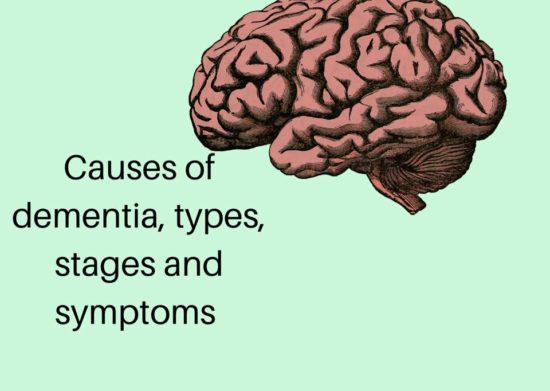Causes of dementia: types, stages, and symptoms
Dementia is a combination of medical symptoms associated with deficits in all or some parts of the brain and their functions.
Dementia affects individuals differently, depending on the part of the brain is affected.
Table of Contents
Causes of dementia
Not all dementia causes are known, as several diseases cause dementia, including medication side effects, vitamin deficiencies, and thyroid problems.
Other Causes of dementia are;
Age
Genetic
Traumatic brain injury
The main types of progressive dementia are;
- Alzheimer’s disease
- Vascular dementia
- Mixed dementia
- Frontotemporal dementia
- Lewy body dementia
- Alzheimer’s disease: Is the most common cause of dementia and accounts for over 60 percent of cases. Alzheimer’s disease patients have abnormal proteins in their brain cells.
The abnormal proteins damage healthy nerve cells and chemical connections between brain cells.
Abnormalities in the gene can increase your risk of having dementia, but research shows that a particular gene increases your risk at a higher chance.
Apolipoprotein E4 (APOE) in your gene means dementia could run in your family.
Causes of Dementia
- Vascular dementia: Is the second most common type of dementia. When the arteries are tighter, and the blood flow to the brain is reduced. This can damage the nerve cells. Vascular dementia occurs when there is a blood vessel blockage in the brain
- Mixed dementia: This indicates that the patient has a combination of different types of dementia, for example, an individual diagnosed with Alzheimer’s disease and vascular dementia together.
- Frontotemporal dementia is a group of conditions associated with deficits of the brain’s front and side parts. The areas most affected are associated with behavior and personality.
- Lewy body dementia: is named after the scientist who discovered them. It occurs when abnormal proteins in the nerve cells prevent the brain from sending chemical signals.
Stages of progressive dementia
The majority of dementia cases are progressive. The stages below show that the symptoms get worse gradually.
Stage 1: Patient has no activity limitation
Stage 2: Patient has no activity limitation, but started showing symptoms
Stage 3: Patient started showing little restrictions on daily activities
Stage 4: Patient needs help with daily activities
Stage 5: Patient has significantly low physical or mental abilities
Stage 6: Patient unable to function independently
Symptoms of dementia
Some diseases show symptoms like dementia, but the most common symptom of dementia is;
- Difficulty understanding what is seen
- Inability to focus
- Memory loss
- Inability to communicate properly
Disclaimer: Any action you take upon the information presented in this article is at your own risk. This article is strictly for informational purposes. The author is not a medical practitioner and as such you should not substitute the information here for professional advice.











